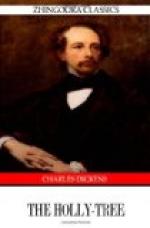This reminiscence brought the Welsh Inns in general before me; with the women in their round hats, and the harpers with their white beards (venerable, but humbugs, I am afraid), playing outside the door while I took my dinner. The transition was natural to the Highland Inns, with the oatmeal bannocks, the honey, the venison steaks, the trout from the loch, the whisky, and perhaps (having the materials so temptingly at hand) the Athol brose. Once was I coming south from the Scottish Highlands in hot haste, hoping to change quickly at the station at the bottom of a certain wild historical glen, when these eyes did with mortification see the landlord come out with a telescope and sweep the whole prospect for the horses; which horses were away picking up their own living, and did not heave in sight under four hours. Having thought of the loch-trout, I was taken by quick association to the Anglers’ Inns of England (I have assisted at innumerable feats of angling by lying in the bottom of the boat, whole summer days, doing nothing with the greatest perseverance; which I have generally found to be as effectual towards the taking of fish as the finest tackle and the utmost science), and to the pleasant white, clean, flower-pot-decorated bedrooms of those inns, overlooking the river, and the ferry, and the green ait, and the church-spire, and the country bridge; and to the pearless Emma with the bright eyes and the pretty smile, who waited, bless her! with a natural grace that would have converted Blue-Beard. Casting my eyes upon my Holly-Tree fire, I next discerned among the glowing coals the pictures of a score or more of those wonderful English posting-inns which we are all so sorry to have lost, which were so large and so comfortable, and which were such monuments of British submission to rapacity and extortion. He who would see these houses pining away, let him walk from Basingstoke, or even Windsor, to London, by way of Hounslow, and moralise on their perishing remains; the stables crumbling to dust; unsettled labourers and wanderers bivouacking in the outhouses; grass growing in the yards; the rooms, where erst so many hundred beds of down were made up, let off to Irish lodgers at eighteenpence a week; a little ill-looking beer-shop shrinking in the tap of former days, burning coach-house gates for firewood, having one of its two windows bunged up, as if it had received punishment in a fight with the Railroad; a low, bandy-legged, brick-making bulldog standing in the doorway. What could I next see in my fire so naturally as the new railway-house of these times near the dismal country station; with nothing particular on draught but cold air and damp, nothing worth mentioning in the larder but new mortar, and no business doing beyond a conceited affectation of luggage in the hall? Then I came to the Inns of Paris, with the pretty apartment of four pieces up one hundred and seventy-five waxed stairs, the privilege of ringing the bell all day long without influencing




